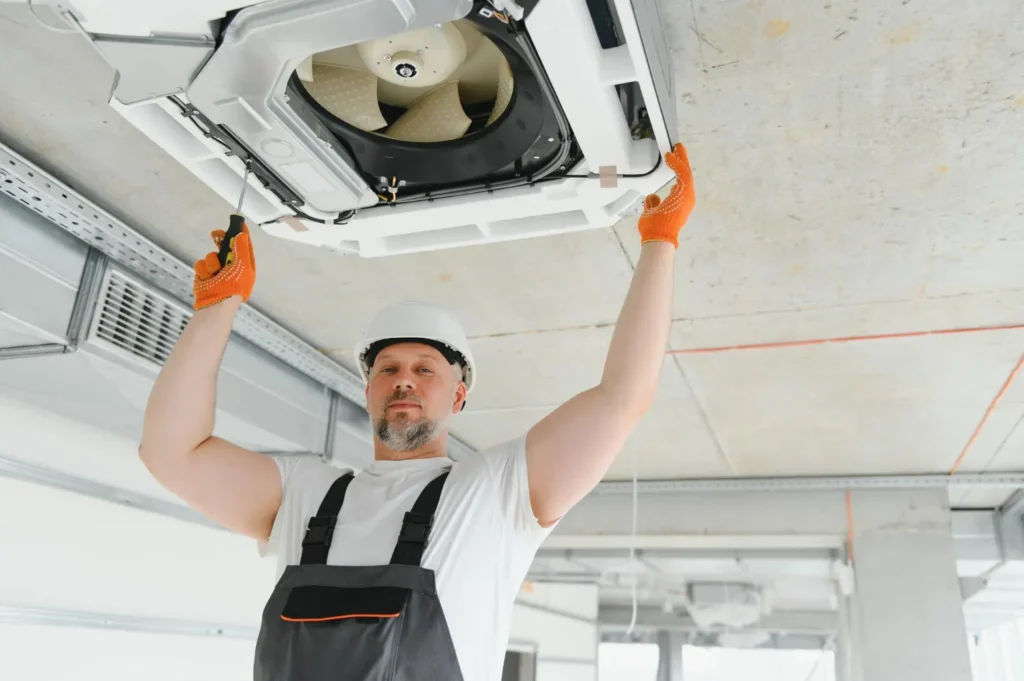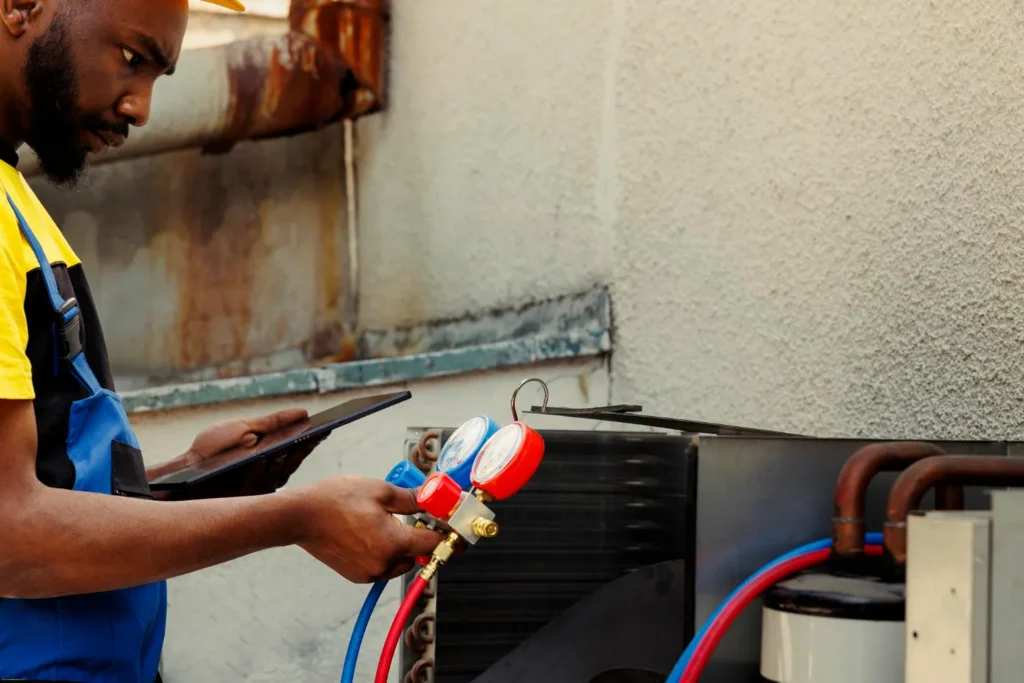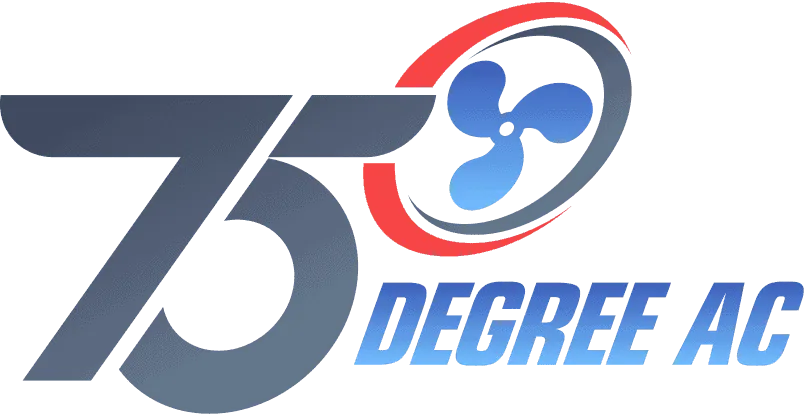Reduce Your Utility Bills With AC Repair: Are your energy bills leaving you hot under the collar? It’s time to take control and beat the heat while saving big with our comprehensive guide on AC repair. Dive into the world of HVAC optimization as we unveil a treasure trove of tips and tricks to maximize your cooling system’s efficiency. From DIY solutions to expert advice, we’ll empower you to transform your home or office into a calm oasis without breaking the bank. Say goodbye to sweating over high electricity bills and hello to a more comfortable, cost-effective lifestyle!
Table of Contents
The Science of Savings: How Your Air Conditioning Efficiency Lowers Energy Consumption

The unit’s operational efficiency heavily influences energy consumption in air conditioning systems. An inefficient AC can use up to 30-50% more energy compared to a well-maintained one. This section delves into the mechanics of how AC systems function and how repairs can enhance their efficiency.
The efficiency of an air conditioner is measured by the Seasonal Energy Efficiency Ratio (SEER), which calculates the cooling output during a typical cooling season divided by the total electric energy input during the same period. Higher SEER ratings indicate better energy efficiency. Common issues like refrigerant leaks, dirty coils, or faulty thermostats can dramatically decrease an AC’s SEER rating. Timely repairs ensure that these components function correctly, thus maintaining the system’s efficiency.
By understanding and addressing the technical aspects of your AC system, such as the condenser, evaporator coil, and refrigerant levels, you can ensure it operates at peak efficiency. Regular maintenance checks can prevent the gradual decline in AC performance, which in turn lowers energy consumption and Reduce Your Utility Bills with AC Repair.
Common Air Conditioner Issues That Skyrocket Your Monthly Bill
Inefficient air conditioning units are often the culprits behind soaring utility bills. Several typical malfunctions force the AC to expend more energy than necessary, leading to increased costs. Understanding these issues is the first step towards mitigating their impact on your energy consumption:
- Refrigerant Leaks: When your air conditioners loses refrigerant, it struggles to cool your home effectively, forcing it to operate longer and consume more energy. This not only increases your energy bills but can also shorten the lifespan of your system.
- Dirty Coils: The coils in your AC unit play a crucial role in transferring heat. When they are clogged with dirt and debris, the efficiency of this heat transfer is reduced. This inefficiency forces your system to work harder and longer to achieve the set temperature, leading to higher energy consumption.
- Faulty Sensors: Temperature sensors that are not functioning correctly can cause your AC to run continuously or cycle too frequently. This continuous operation can lead to excessive power usage and increased wear and tear on your system.
Addressing these issues is vital not just for reducing energy consumption but also for preventing more extensive and expensive repairs down the line. Regular diagnostics and maintenance checks by certified HVAC technicians are crucial. They ensure that these common problems are identified and corrected early, helping to keep your AC running smoothly and efficiently.
Routine Your Air Conditioner Maintenance: The First Step to Lower Bills
Routine maintenance is the cornerstone of efficient AC operation and lower utility bills. This section emphasizes the importance of regular checks and how they prevent costly repairs and Reduce Your Utility Bills with AC Repair.
A comprehensive maintenance routine includes:
- Cleaning air filters.
- Checking and topping up refrigerant levels.
- Inspecting and cleaning ductwork.
- Checking thermostats and controls.
- Cleaning evaporator and condenser coils.
These steps ensure that every part of the AC system is working in harmony, which minimizes the strain on the unit and Reduce Your Utility Bills with AC Repair.
Expert Repairs vs DIY: What’s Best for Your Wallet?

In the realm of AC maintenance, the debate between hiring professionals and attempting DIY solutions is ongoing. This section analyzes the long-term financial implications of each approach, providing readers with a clear perspective on what is truly cost-effective.
DIY AC repairs can be tempting due to the immediate cost savings on labor. However, the complexities of modern HVAC systems often require specialized knowledge and tools that most homeowners need to possess. Mistakes in DIY repairs can lead to more significant problems, such as incorrect handling of refrigerant or improper installation of components, which can significantly decrease system efficiency and increase operational costs over time.
On the other hand, professional HVAC technicians are equipped with the training, certifications, and experience necessary to diagnose and fix issues efficiently and effectively. They can ensure that all repairs are compliant with industry standards and local regulations, which not only optimizes the unit’s performance but also keeps your system running safely. Ultimately, investing in expert repairs can lead to substantial savings by preventing costly breakdowns and optimizing energy efficiency, thereby reducing your utility bills in the long run.
Case Study: Real-Life Examples of Savings from AC Repairs
This section will share several success stories from various sectors—including residential, healthcare, and commercial spaces—that illustrate the tangible benefits of timely AC repairs and maintenance.
For instance, a Houston-based restaurant experienced a significant decrease in monthly utility bills after a comprehensive overhaul of its aging HVAC system. The repairs included fixing a refrigerant leak and updating the ductwork. As a result, the restaurant saw a 20% reduction in energy consumption, which translated to thousands of dollars saved annually.
Another example comes from a local school where outdated thermostats were replaced with programmable ones as part of the AC repair process. This simple change allowed for better temperature control and Reduce Your Utility Bills with AC Repair and the operational hours of the AC units, leading to a 15% savings on energy bills.
These real-life examples demonstrate not only the potential financial benefits of proper AC maintenance and repair but also highlight the importance of addressing AC issues promptly to avoid inflated energy costs.
Technological Advances in Your AC Repair Service and Maintenance
The field of HVAC system technology is constantly evolving, with new tools and methods emerging that enhance the efficiency and reliability of air conditioning systems. This section highlights how modern techniques and tools are transforming air conditioner repair service and system maintenance practices.
Advancements such as smart thermostat, which allow for more precise temperature control and can be adjusted remotely, are becoming commonplace. These devices help in maintaining optimal indoor temperatures without unnecessary energy expenditure. Additionally, the use of HVAC software systems can help technicians diagnose issues quickly and accurately, ensuring that repairs are carried out effectively the first time.
Innovative practices such as predictive maintenance, where data-driven insights predict when an AC unit might fail or require servicing, are also becoming more prevalent. This proactive approach to maintenance ensures that components are replaced or repaired before they malfunction, thereby avoiding unexpected breakdowns and reducing the likelihood of expensive emergency repairs.
Seasonal Your HVAC Servicing: Timing Your Repairs for Optimal Performance
Maintaining an AC unit is not just about fixing it when it breaks down; it’s also about when you choose to service it. This section provides a guide on the best times of the year for maintenance to ensure your AC operates efficiently during peak seasons.
For instance, in Houston, it’s advisable to schedule a detailed inspection and maintenance of your AC system in early spring. This preparation ensures that the system is clean, functioning efficiently, and ready to handle the heavy load during the hot summer months. Fall is another crucial time for maintenance to prepare the system for the colder months, even though the AC’s usage might be lower.
This timing is not only about keeping the unit in top condition but also about ensuring that any repairs are carried out when it is least disruptive and most cost-effective. Avoiding peak times for repairs can also result in lower costs and faster service as demand for HVAC technicians is not at its peak.
AC Repair as an Investment: Analyzing the Return on Investment (ROI)

This section breaks down the costs vs benefits of regular AC repair and maintenance in terms of Reduce Your Utility Bills with AC Repair. Investing in your AC unit is akin to investing in any other significant asset of your business or home. Regular upkeep not only prolongs the life of the unit but also improves its efficiency, which translates into lower energy costs.
Calculating the ROI of AC repairs involves considering the Reduce Your Utility Bills with AC Repair against the cost of periodic repairs and maintenance. Typically, the savings from lower energy consumption will offset the cost of professional maintenance within a few years, thereby justifying the initial expenditure.
Additionally, a well-maintained AC system tends to have a higher resale value. It is a crucial selling point for commercial and residential properties, further enhancing the ROI.
Tailoring AC Repair Needs for Different Business Types
Different types of businesses have unique needs when it comes to AC repair and maintenance. This section offers customized advice for various sectors, such as restaurants, gyms, and healthcare facilities, addressing their specific requirements.
Restaurants, for instance, need robust systems that can handle the extra heat from kitchens and the constant traffic of customers. Fitness centers require efficient air circulation to maintain a comfortable environment for intense physical activity. Healthcare facilities, on the other hand, have stringent requirements for air quality and temperature control to ensure the safety and comfort of patients.
For each business type, this section will provide tailored strategies for AC maintenance and repair that consider the unique challenges and operational demands of the industry.
FAQs About Reduce Your Utility Bills with AC Repair
How often should I schedule maintenance for my AC unit to keep my utility bills low?
It’s recommended to have your AC system professionally inspected and serviced at least once a year, ideally during the spring before the peak cooling season begins. This ensures your system is running efficiently and can help prevent unexpected issues during hotter months.
Can a dirty air filter really impact my AC’s energy consumption?
Absolutely. A clogged or dirty air filter restricts airflow, forcing your AC to work harder to circulate air. This not only increases energy consumption but can also lead to other problems like frozen evaporator coils. Changing your air filter regularly (every 1-3 months, depending on usage and type) can improve your AC’s efficiency and Reduce Your Utility Bills with AC Repair.
Is it worth upgrading to a high-efficiency AC unit?
Yes, especially if your current unit is old or inefficient. Modern AC units are designed to be more energy-efficient and can significantly Reduce Your Utility Bills with AC Repair. Look for units with a high SEER (Seasonal Energy Efficiency Ratio) rating—the higher the SEER rating, the more efficient the unit.
What are the signs that my AC needs repair?
Common signs include unusual noises, weak airflow, warm air blowing when the AC is set to cool, frequent cycles, and higher-than-usual energy bills. If you notice any of these issues, it’s advisable to contact a professional HVAC technician to inspect your system.
How do refrigerant leaks affect my energy bills?
Refrigerant leaks can significantly decrease your AC’s efficiency. The system has to run longer to reach the desired temperature, which increases energy consumption. Suppose you suspect a refrigerant leak due to ice buildup on the coils or a hissing sound from the unit. In that case, it’s crucial to have it repaired immediately to avoid further inefficiency and damage.
Conclusion – Reduce Your Utility Bills with AC Repair
Effective AC maintenance and timely repairs are crucial for Reduce Your Utility Bills with AC Repair. By ensuring that your AC system is running at peak efficiency, you can not only extend the lifespan of your equipment but also significantly decrease your monthly energy costs. Regular checks for refrigerant levels, clean coils, and functional sensors are essential tasks that help in maintaining this efficiency. Moreover, recognizing the signs of AC issues early and addressing them promptly can prevent minor problems from escalating into more significant, costly repairs later on. Ultimately, investing in professional AC repair and maintenance services is an investment in your property’s operational efficiency and cost-effectiveness. By taking these proactive steps, you can enjoy a more relaxed environment and lower utility bills, making it a win-win situation for both your comfort and your wallet.
